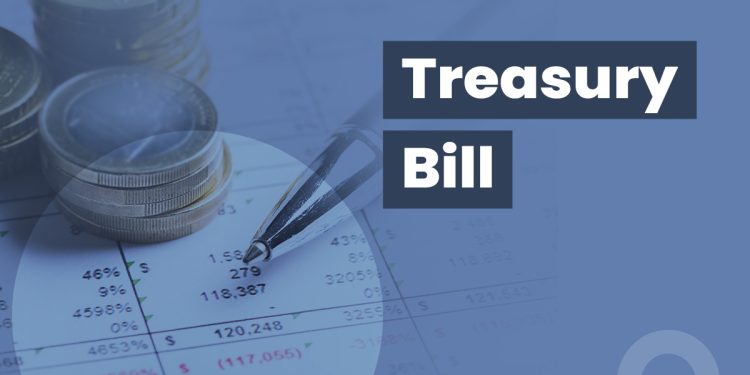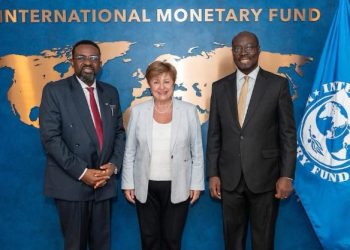Investor appetite for Ghana’s short-term government securities surged last week as the latest Treasury bill auction recorded massive oversubscription, indicating sustained confidence in the government’s ability to meet its debt obligations.
The government sought to raise GH₵7.7 billion but received a staggering GH₵28.1 billion in bids from investors, resulting in an oversubscription rate of 264.84%, up sharply from GH₵21 billion the previous week.
According to auction results, 37.80% of bids for the 91-day bill, 65.64% of the 182-day bill, and 73.36% of the 364-day bill were accepted.
Despite the heavy demand, yields on all tenors dropped significantly
The 91-day bill yield fell by 289 basis points to 10.84%, the 182-day bill dropped by 139 basis points to 13.23%, and the 364-day bill eased by 43 basis points to 14.31%.
The results point to heightened investor demand for safe government instruments amid narrowing returns, with analysts suggesting the downward trend in yields may reflect market expectations of improved fiscal management and inflation control in the second half of the year.
Secondary market slips slightly
On the secondary bond market, trading volumes dipped slightly by 4.6% over the week, closing at GH₵4.2 billion.
Despite the marginal slowdown, activity remained solid, with new Government of Ghana (GoG) notes and bonds dominating the space, accounting for 57.90% of total volumes.
Treasury bills followed with 35.75% of trades, while corporate bonds and sell-buy-back transactions contributed 4.80% and 1.54%, respectively, according to the Ghana Fixed Income Market (GFIM).
Market watchers believe the strong showing of GoG bonds on the secondary market reflects investors’ sustained search for liquidity and predictability, especially following the domestic debt exchange programme and ongoing reforms in public financial management.
Cedi eases slightly
On the currency front, the Ghanaian cedi slipped modestly against major trading currencies, but still maintained a robust year-to-date appreciation.
The local unit depreciated by 0.19% against the US dollar, ending the week at GH₵10.45, but remains up 40.67% since the start of the year.
Against the British pound, the cedi dipped 0.06% to GH₵14.0245, while it fell 0.84% to GH₵12.2501 against the euro.
Indicative open market rates also pointed to further weakness, with midrates closing at GH₵10.55 to the dollar, GH₵14.39 to the pound, and GH₵12.44 to the euro.
The marginal depreciation is seen by analysts as a temporary correction, given the cedi’s sharp appreciation over the year, supported by strong inflows from cocoa syndication, IMF disbursements, and improved investor sentiment.
GSE Index jumps 4.48%
In equities, the Ghana Stock Exchange continued its upward trajectory with the GSE Composite Index rising 4.48% over the week to close at 6,673.11 points, bringing the year-to-date return to an impressive 36.51%.
The rally was driven by solid gains in the shares of telecom giant MTN Ghana (MTNGH), Fan Milk Ltd (FML), Republic Bank Ghana (RBGH), Ghana Oil Company (GOIL), Ecobank Ghana (EGH), and gold-backed exchange-traded fund NewGold (GLD).
MTN Ghana led the charge, rising 9.06% to close at GH₵3.25, with a 30% return so far this year. FML rose by 3.66% to GH₵4.25 (YTD: 14.86%), while RBGH climbed 3.33% to GH₵2.98 (YTD: 40.19%). GLD gained 2.51% to GH₵373.75, trimming its year-to-date loss to 4.29%, while GOIL and EGH advanced by 1.42% and 0.46% respectively.
However, the upbeat market mood was slightly tempered by declines in Cal Bank (CAL), which lost 3.64% to GH₵0.53, and Societe Generale Ghana (SOGEGH), which dipped 4.37% to GH₵1.97.
Market activity soared, with trading volumes jumping by 264.37%—from 9.75 million shares to over 35.5 million shares. The value of shares traded hit approximately GH₵140 million, marking one of the most active weeks in recent months.
Sector analysts believe that financial stocks and ICT shares are likely to remain pivotal drivers of the market’s performance in the coming weeks, buoyed by improved earnings expectations and positive investor sentiment.
Outlook
The confluence of strong demand for government securities, solid equity gains, and marginal currency adjustments suggests a cautiously optimistic economic outlook.













